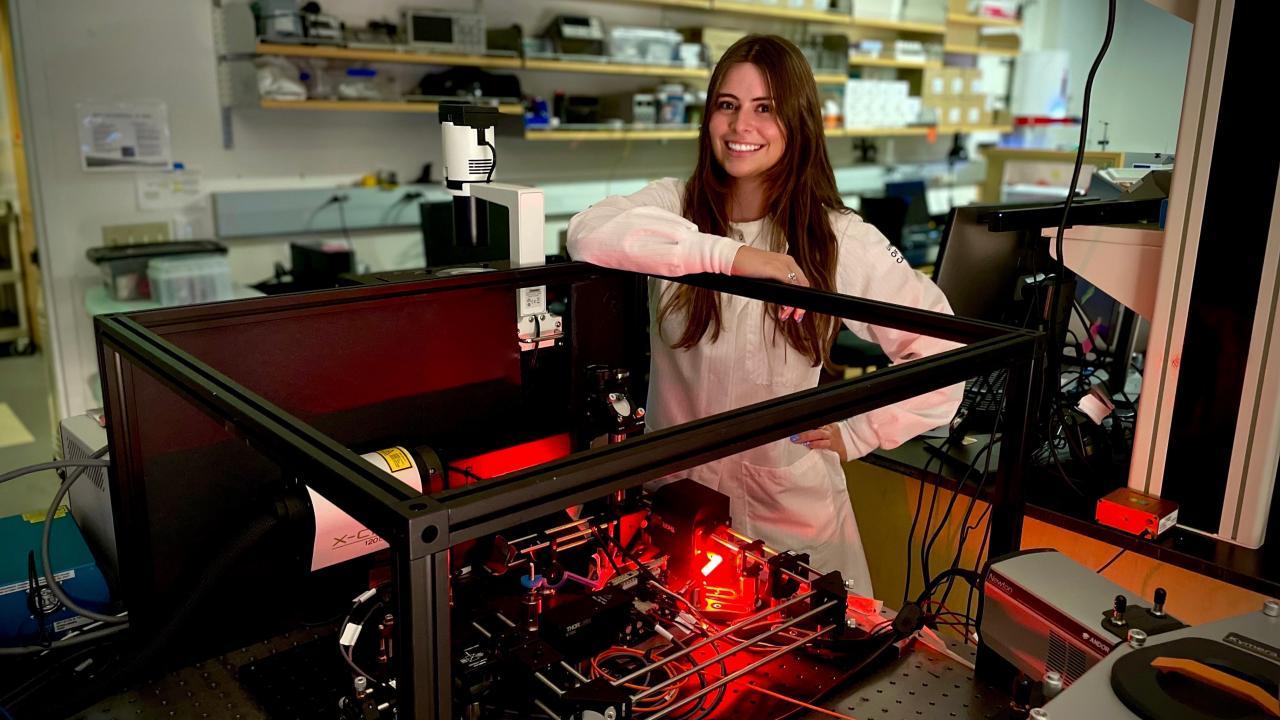
BME Graduate Student Hannah O'Toole Wins Prestigious NIH Research Fellowship
Biomedical engineering Ph.D. student Hannah O'Toole was recently awarded a National Institutes of Health T32 Chemical Biology Program fellowship for her work in sensing biomarkers for cancerous tumors through biophotonics technology. "The whole idea of biophotonics is to use light to interrogate biological samples, typically to make some diagnostic observations," O'Toole explains.
Currently biomedical researchers diagnose some medical conditions through Raman scattering, which involves collecting light after it has changed energy while interacting with the chemical bonds in complex biological samples. The spectrum of light after using Raman scattering on tumor tissue or a blood sample from a patient with cancer can identify the disease very specifically. However, Raman scattering is weak, so it’s hard to detect cancer early when tumors are still small.
So, O’Toole is creating an array of “molecular “nets” called metal-organic frameworks (MOFs) that can capture and enrich specific tumor markers over time. These MOFs are decorated with small metal nanoparticles with plasmonic abilities. These nanoparticles greatly boost the Raman scattering effect, and she hopes they will enable early and non-invasive diagnostics for more types of cancer.
She is also working with electronic sensing platforms using biophotonics technology that could have applications for cancer biopsies. They’re a kind of ‘artificial nose’ that can be applied to breath samples to detect volatile organic compounds that we exhale. “There is some remarkable work where dogs can be trained to 'smell' cancer odors based on the presence of very small amounts of cancer-related VOCs that emanate from breath and skin. We don’t know exactly how dogs do this, but the underlying goal is to mimic their ability with specialized chemical sensors.”
O’Toole believes that researchers can overcome the technical challenges of miniaturizing these technologies by creating a sensitive and specific sensor that combines Raman scattering, plasmonic nanoparticles, and specialized MOFs. “We think that eventually we’ll be able to detect down to a few molecules,” she says.
Ultimately, she hopes to create a new platform for early cancer detection. However, she says that in the near future the technologies she’s developing could monitor for cancer recurrence or therapeutic efficacy.
“It takes years to validate the performance of the technology because you need to test it on hundreds of patient samples. But we are [still] developing the underlying materials right now to even be able to test those samples. So, unfortunately, it may be years before this technology is readily available in medical offices, but you have to start somewhere!”
O’Toole’s next steps include joining a cohort of other interdisciplinary NIH Chemical Biology Program fellows and learning from them. She’s also working closely with her mentor while immersing herself in her research project.
“This quarter I’ll be honing in on the chemical synthesis of my new sensors and working to tune them for detecting cancer features in test samples I’ve built up to look like patient samples. It’s definitely trial and error but already has been very fun to try to put all the pieces together. Then, in [my mentor Dr. Marie Heffern’s chemistry lab], I will learn more principles of organic chemistry to further tune my sensors to increase their binding affinity towards the cancer VOCs I am interested in detecting.”
O’Toole also passionately supports women in STEM and advertises that fact. “It’s very important to me to advocate not only on behalf of other women but for all people from minority and disadvantaged backgrounds.”
She’s currently the chair of BME’s Health, Equity, and Wellness subcommittee for Graduate Recruitment and Retention. The committee works to increase diversity and equity within the BME department. She’s also a member of the Program-Level Assessment Capacity Enrichment for Equity (PACE4E) cohort coaching program, which reviews program learning outcomes to incorporate just and equitable practices.
She has this advice for young women or other under-represented minority students interested in science and engineering:
“Don’t be afraid to ask questions or ask for help. I do think that UCD is particularly trying to make their programs more equitable and accessible, but sometimes you have to go out of your comfort zone and make opportunities for yourself. Attend office hours, be curious, and be open to new opportunities for growth. Turn confusion into curiosity and keep in mind that at the end of every hardship there is a lesson and something better to come.”
She appreciates the community, resources, and support she has found here at UC Davis’ BME department.
“At the graduate level, I have definitely felt extremely supported by UCD in terms of my research. I have the unique experience of having done the BME undergraduate program here at UCD as well and think that having those four years in the department helped me to foster a strong sense of community. Over the course of both my undergraduate and graduate research I have had wonderful mentorship not only from my Major Professor, Dr. Randy Carney but also from my fellow lab members. My department also has the Biomedical Engineering Student Association (BESA) which is a great community of graduate students in BME and I have made some wonderful friends and found other mentors within that group. I love UCD as a whole because I feel that the faculty, staff, and students all have my success in mind and do their best to help me achieve my goals.”
